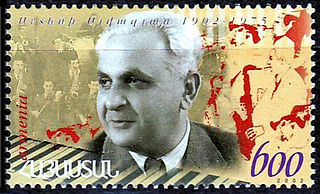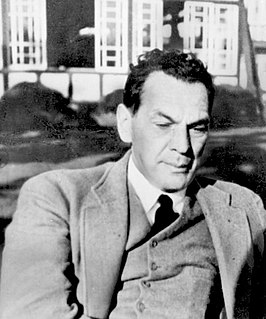 W
WHovhannes Harutyuni Abelian was an Armenian actor, People's Artist of the Armenian SSR (1925).
 W
WHovhannes (Ivan) Abgari Adamian was an Armenian engineer, an author of more than 20 inventions. The first experimental color television was shown in London in 1928 based on Adamian's tricolor principle, and he is recognized as one of the founders of color television.
 W
WSultan Majid Afandiyev, also spelled Efendiyev was an Azerbaijani revolutionary and statesman, one of the founders of the Communist Party of Azerbaijan.
 W
WMahmud Aliyev Ismayil oglu (Azerbaijani: Mahmud Əliyev İsmayıl oğlu was an Azerbaijani politician and diplomat.
 W
WAgha Mashadi Aminov Aghakerim oglu, also spelled as Aga Aminov, was an Azerbaijani statesman who served as Minister of Industry and Trade in the fourth cabinet of Azerbaijan Democratic Republic, and was member of Parliament of Azerbaijan.
 W
WGaregin Abramovich Apresov was a Soviet diplomat, most notable for his tenure in Xinjiang during Sheng Shicai's rule.
 W
WNatallia Aliaksiejeŭna Arsieńjeva (1903–1997) was a Belarusian playwright, poet, and translator. She was married to Francišak Kušal.
 W
WHazi Aslanov was an Azerbaijani major-general of the Soviet armoured troops during World War II. Aslanov was one of the youngest ever Soviet generals when he promoted to the rank of major general at the age of 34 years and a month on March 13, 1944. He was awarded the Hero of the Soviet Union title twice. The second Hero title was posthumously awarded on July 12, 1991, by Mikhail Gorbachev, at the constant recommendations by Heydar Aliyev.
 W
WArtemi (Harutyun) Ayvazyan was a Soviet Armenian composer, conductor, founder of the Armenian State Jazz Orchestra, and People's Artist of Armenia (1962).
 W
WAzim Aslan oglu Azimzade was an Azerbaijani artist and caricaturist. He was awarded the honorary title of People's Artist of the Azerbaijan SSR.
 W
WAfrasiyab Badal oglu Badalbeyli was a Soviet Azerbaijani composer, with noble Iranian origins (he was the descendant of Bahman Mirza and Abbas Mirza, " conductor and music critic, author of the music and libretto of Giz Galasi, the first Azerbaijani ballet and the first ballet in the Muslim Orient.
 W
WMir Jafar Baghirov Abbas oglu was the communist leader of the Azerbaijan SSR from 1932 to 1953, under the Soviet leadership of Joseph Stalin.
 W
WNikolai Konstantinovich Baibakov was a Soviet statesman and economist who served as Minister of Oil Industry from 1944 to 1946 and 1948 to 1955 and Chairman of the State Planning Committee from 1955 to 1957 and 1965 to 1985. He was awarded a Hero of Socialist Labour in 1981.
 W
WMaryam Teymur qizi Bayramalibeyova was an Azerbaijani social activist and feminist of ethnic Talysh background.
 W
WAbulfaz Faraj oghlu Garayev, also spelled as Abulfaz Qarayev, was the first Azerbaijani pediatrician, honored scientist of Azerbaijan.
 W
WMirza Davud Baghir oglu Huseynov, also spelled Husseynov or Guseynov, was an Azerbaijani revolutionary and statesman.
 W
WMammad Yusif Jafarov Hajibaba oglu was an Azerbaijani statesman.
 W
WArtemic Bagratovich Khalatov was a Bolshevik revolutionary who ran Gosizdat, the State Publishing House, from 1927-1930.
 W
WLev Davidovich Landau was a Soviet physicist who made fundamental contributions to many areas of theoretical physics.
 W
WMustafa Mahmudov was an Azerbaijani political leader who was instrumental in the nation's independence movement in the early 1900s. He served as a member of parliament for the second Russian State Duma in 1907 and was Deputy Secretary of the Azerbaijani National Council at its initiation in 1918. Mahmudov also was a member of Azerbaijan's Commission on Agriculture. He represented the Musavat political party.
 W
WBahatdin Shahveled oglu Mirzayev was an Azerbaijani Red Army captain and a Hero of the Soviet Union. During World War II, Mirzayev served as a battery commander in the 416th Rifle Division. During the Vistula–Oder Offensive, Mirzayev corrected the battery's fire and was wounded, reportedly enabling it to destroy multiple German firing points. On the next day his battery knocked out German artillery pieces which had been slowing the infantry's advance. Two days after the start of the offensive, his battery destroyed two German tanks and an armored personnel carrier, enabling the capture of the village. For his actions Mirzayev received the title Hero of the Soviet Union on 24 March 1945. He was seriously wounded in the Battle of Berlin and was discharged upon recovery. Postwar, Mirzayev worked as head of the militarized guard department at the Azerbaijan SSR Ministry of Communications.
 W
WGazanfar Mahmud oglu Musabekov or Musabeyov was an Azerbaijani Bolshevik revolutionary and Soviet statesman. He was Chairman of the Central Executive Committee of Azerbaijan SSR from 1929 to 1931 and he headed the government of the Transcaucasian SFSR from 1931 to 1936. During the Great Purge, Musabekov was arrested, accused of plotting against the Soviet state, sentenced to death and executed on 9 February 1938.
 W
WHuseyn Rahmanov was the chairman of the Council of People's Commissars of the Transcaucasian Socialist Federative Soviet Republic from 12 December 1933 to 22 August 1937. He was one of those repressed in the 1930s and during the Great Purge, he was arrested, accused of plotting against the Soviet state, sentenced to death and executed.
 W
WMatvey Ivanovich Skobelev was a Russian Marxist revolutionary and politician.
 W
WRichard Sorge was a German journalist and Soviet military intelligence officer who was active before and during World War II and worked undercover as a German journalist in both Nazi Germany and the Empire of Japan. His codename was "Ramsay". A number of famous personalities considered him one of the most accomplished spies.
 W
WAyna Mahmud qizi Sultanova was an Azerbaijani Communist party activist and statesperson. She was one of the first Azeri female revolutionaries and in 1938, became the first Azerbaijani female cabinet minister.
 W
WSergo Zakariadze was a renowned Georgian actor.
 W
WZeynal Zeynalov — politician, activist and member of Second Duma of Russian Empire in 1907.